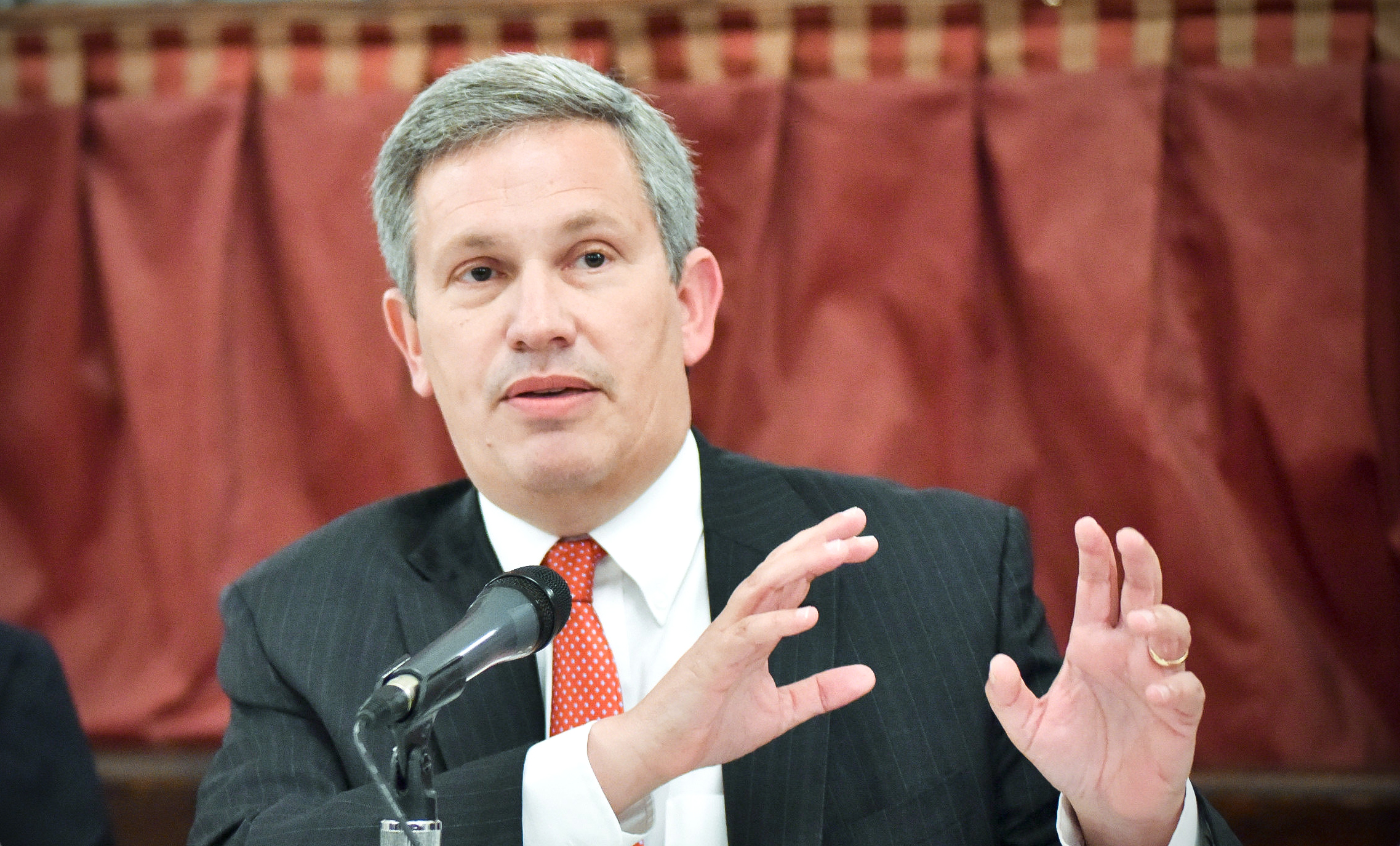NY State Bar Association Summit to Focus on Legal Implications of White Nationalism
The panel is planned for the upcoming Presidential Summit at the State Bar Association's week-long annual meeting in late January. The discussion is scheduled for Jan. 29.
December 16, 2019 at 03:45 PM
5 minute read
 Henry M. Greenberg, president of the New York State Bar Association. Photo: David Handschuh/NYLJ
Henry M. Greenberg, president of the New York State Bar Association. Photo: David Handschuh/NYLJ
The New York State Bar Association is bringing in former U.S. Secretary of Homeland Security Jeh Johnson; the mayor of Dayton, Ohio; one of the country's leading civil rights attorneys; and others to discuss the legal side of domestic terrorism fueled by white nationalism next month.
The panel is planned for the upcoming Presidential Summit at the State Bar Association's week-long annual meeting in late January. The discussion is scheduled for Jan. 29.
Hank Greenberg, the current president of the State Bar Association and a shareholder at Greenberg Traurig, said the picks were meant to represent a diverse set of viewpoints on how to address domestic terrorism, including mass shootings.
"This is an extraordinary group of panelists to discuss an incredibly important subject," Greenberg said.
While Johnson may be the most familiar name to most, each participant on the panel has something to bring to the table. Johnson, currently a partner at Paul, Weiss, Rifkind, Wharton & Garrison, was secretary of homeland security during President Barack Obama's second term.
He is set to be joined by Nan Whaley, the mayor of Dayton, where nine people were killed and 17 others were injured in one of the deadliest mass shootings of the past year. Whaley has since emerged as a national advocate for stronger gun control laws.
"She's lived firsthand with the horror of domestic terrorism," Greenberg said.
While investigators never determined a specific motivation behind the attack, it was determined that the shooter had grown more attracted to violence in the months that preceded the event.
The American Civil Liberties Union, which once defended the rights of a group of white supremacists to march in a community of Holocaust survivors, will also be represented at the panel.
David Cole, national legal director for the ACLU, is expected to bring a perspective to the discussion that's not always considered after a mass shooting or incident of domestic terrorism: how to prevent a future attack without unlawfully encroaching on an individual's civil rights.
"How should it be investigated, how should it be prosecuted in appropriate cases, and how do we deal with these issues in a way that's consistent with our constitution and values as a free and open society?" Greenberg said.
Leonard Zeskind, who authored one of the leading books on the history of white nationalism and founded a nonprofit organization to research the issue, will also be on the panel to share his experience. Zeskind wrote "Blood and Politics: The History of the White Nationalist Movement from the Margins to the Mainstream."
He's the founder and president of the Institute for Research and Education of Human Rights, which does comprehensive research on white nationalism and other forms of bigotry, and purports to organize movements to confront those issues.
"He's written the seminal book on the subject of white nationalism," Greenberg said. "He's an academic. His perspective should be really interesting."
They'll be joined by Frank Figliuzzi, a former FBI assistant director for counterintelligence under Obama. Figluzzi, who's now a frequent commentator on NBC News and MSNBC, served in the national role for more than a year. Figluzzi has a law degree, but doesn't practice.
The panel will be moderated by Craig Boise, the dean of Syracuse University College of Law, which recently experienced its own series of racist incidents on campus. Those incidents weren't physically violent, but some have been critical of the university's response.
Greenberg said the five panelists, coupled with Boise as moderator, should provide an interesting discussion for anyone interested in how civil rights intersect with issues like domestic terrorism and stronger gun control.
"This is an extraordinary group of panelists to discuss an important subject," Greenberg said. "When we see the horror of mass shootings—gun violence fueled by extreme ideologies—we all recoil in horror. But when we recover from the shock, we have to figure out how to address it."
The State Bar Association may also receive new recommendations in January from its task force on mass shootings and assault weapons, composed of nearly two dozen attorneys, on how new gun control measures could prevent future mass shootings.
Those recommendations could then be adopted by a meeting of the State Bar Association's governing body, which is set to convene at the annual meeting.
READ MORE:
New York Moves Closer to Axing Mental Health Question From Bar Application
Elena Kagan Named to Receive NY State Bar Association's Highest Honor
NY Lawmakers Eye DiFiore's Court Reform Plan for Impact on Judicial Diversity
This content has been archived. It is available through our partners, LexisNexis® and Bloomberg Law.
To view this content, please continue to their sites.
Not a Lexis Subscriber?
Subscribe Now
Not a Bloomberg Law Subscriber?
Subscribe Now
NOT FOR REPRINT
© 2025 ALM Global, LLC, All Rights Reserved. Request academic re-use from www.copyright.com. All other uses, submit a request to [email protected]. For more information visit Asset & Logo Licensing.
You Might Like
View All
Five Years After Vega Much Remains Unsettled in Pay Frequency Litigation

Spotify GC Steps Down, Opts to 'Step Away From Full-Time Corporate Life'
2 minute read
Dechert Sues Former Attorney For Not Returning Compensation

Law Firms Mentioned
Trending Stories
Who Got The Work
J. Brugh Lower of Gibbons has entered an appearance for industrial equipment supplier Devco Corporation in a pending trademark infringement lawsuit. The suit, accusing the defendant of selling knock-off Graco products, was filed Dec. 18 in New Jersey District Court by Rivkin Radler on behalf of Graco Inc. and Graco Minnesota. The case, assigned to U.S. District Judge Zahid N. Quraishi, is 3:24-cv-11294, Graco Inc. et al v. Devco Corporation.
Who Got The Work
Rebecca Maller-Stein and Kent A. Yalowitz of Arnold & Porter Kaye Scholer have entered their appearances for Hanaco Venture Capital and its executives, Lior Prosor and David Frankel, in a pending securities lawsuit. The action, filed on Dec. 24 in New York Southern District Court by Zell, Aron & Co. on behalf of Goldeneye Advisors, accuses the defendants of negligently and fraudulently managing the plaintiff's $1 million investment. The case, assigned to U.S. District Judge Vernon S. Broderick, is 1:24-cv-09918, Goldeneye Advisors, LLC v. Hanaco Venture Capital, Ltd. et al.
Who Got The Work
Attorneys from A&O Shearman has stepped in as defense counsel for Toronto-Dominion Bank and other defendants in a pending securities class action. The suit, filed Dec. 11 in New York Southern District Court by Bleichmar Fonti & Auld, accuses the defendants of concealing the bank's 'pervasive' deficiencies in regards to its compliance with the Bank Secrecy Act and the quality of its anti-money laundering controls. The case, assigned to U.S. District Judge Arun Subramanian, is 1:24-cv-09445, Gonzalez v. The Toronto-Dominion Bank et al.
Who Got The Work
Crown Castle International, a Pennsylvania company providing shared communications infrastructure, has turned to Luke D. Wolf of Gordon Rees Scully Mansukhani to fend off a pending breach-of-contract lawsuit. The court action, filed Nov. 25 in Michigan Eastern District Court by Hooper Hathaway PC on behalf of The Town Residences LLC, accuses Crown Castle of failing to transfer approximately $30,000 in utility payments from T-Mobile in breach of a roof-top lease and assignment agreement. The case, assigned to U.S. District Judge Susan K. Declercq, is 2:24-cv-13131, The Town Residences LLC v. T-Mobile US, Inc. et al.
Who Got The Work
Wilfred P. Coronato and Daniel M. Schwartz of McCarter & English have stepped in as defense counsel to Electrolux Home Products Inc. in a pending product liability lawsuit. The court action, filed Nov. 26 in New York Eastern District Court by Poulos Lopiccolo PC and Nagel Rice LLP on behalf of David Stern, alleges that the defendant's refrigerators’ drawers and shelving repeatedly break and fall apart within months after purchase. The case, assigned to U.S. District Judge Joan M. Azrack, is 2:24-cv-08204, Stern v. Electrolux Home Products, Inc.
Featured Firms
Law Offices of Gary Martin Hays & Associates, P.C.
(470) 294-1674
Law Offices of Mark E. Salomone
(857) 444-6468
Smith & Hassler
(713) 739-1250






